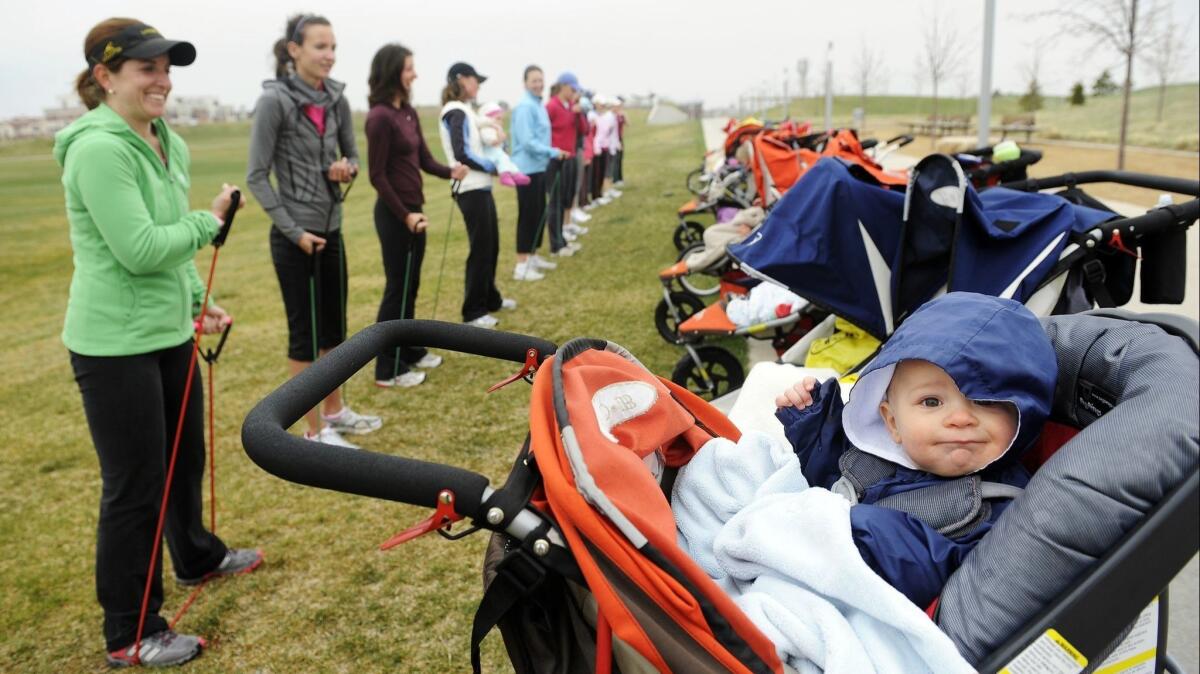To reduce your risk of obesity, it helps to have a mom who follows five healthy habits
- Share via
Mothers lead the way for their children. And new research finds that the paths that moms walk (or the couches they sit and smoke on) make a powerful difference in their children’s propensity to become obese.
A study that tracked close to 17,000 female nurses and their 24,289 kids has found that women who practiced five healthy habits — maintaining a healthy weight, exercising regularly, eating a nutritious diet, consuming no more than moderate quantities of alcohol and not smoking cigarettes — had adolescents that were 75% less likely to be very overweight than the children of moms who practiced none of those healthy habits.
When kids followed their moms along that optimally healthy path, they were 82% less likely to be obese in adolescence than were the children who followed their mothers down a path including none of the healthy behaviors, the study found.
The new research was published this week in the journal BMJ.
Parents’ genetic contributions to their offspring do influence a child’s propensity to obesity. But the steep run-up in child obesity seen in the span of fewer than two generations can’t possibly be explained by genes alone. Today, nearly 1 in 5 children between the ages of 6 and 19 is considered obese, a rate that’s more than tripled since the 1970s.
Since nature can’t be blamed, the authors of the new research went looking for the influence of nurture in driving child obesity. (And let’s face it: When you think of nurture — or blame, for that matter — moms are No. 1.)
The new study parses out which healthy habits seem to contribute most to protecting teens from obesity.
Mom’s own weight status appeared to exert an outsize influence on her kids’ risk for obesity. The children of women whose body mass index falls in the “healthy weight” range were 56% less likely to be obese than were the offspring of either underweight or obese moms.
The children of mothers who don’t smoke were 31% less likely to be obese than were the children of moms who did smoke.
When mothers got 150 minutes or more of moderate-to-vigorous exercise a week, their kids were 21% less likely to be obese in adolescence than were the children of less active moms.

So few of the women who participated in the study were considered heavy drinkers that the authors could not compute the influence of high alcohol consumption on the obesity risks of their offspring. But they did find a small benefit to the children of women who were light or moderate drinkers over teetotalers. When mom consumed between one and seven servings per week, her kids’ risk of obesity was between 11% and 20% lower, respectively.
However, the children of women whose diets scored in the top 40% of the federal government’s healthy-eating guidelines were not less likely to be obese than were the children of women whose nutrition choices landed them in the remaining 60%. Given mothers’ seemingly key role in preparing meals and modeling good nutrition habits, this finding was a bit of a surprise.
That mom’s dietary choices were not as influential as her other health-related choices may reflect a reality of modern-day childhood, the authors explained: Children’s diets are influenced by many factors, including school lunches and the food options they encounter in their neighborhoods.
The new findings lend support to the idea that programs to reduce obesity in children need to look beyond the children themselves.
Recess and gym classes can be restored, school lunches can be improved and television advertising aimed at kids can be limited. But families are still early and powerful influences on children’s preferences. And programs targeting families — and sometimes parents alone — appear to be effective in protecting children from obesity as they grow and their horizons expand.
The stakes are high: A 2017 study by researchers at Harvard’s T.H. Chan School of Public Health calculated that 57% of today’s kids are on track to become obese by the time they reach 35. Unless the inexorable rise in child obesity can be reversed, the study suggested, obesity will be the new normal.
And the struggle is especially acute for low-income families, for which child obesity is a growing problem. Food that is high in fat and calories and low in nutrition is cheap and ubiquitous, making it one of the few indulgences a parent struggling to make ends meet can afford to say “yes” to.
But even for imperfect role models, all is not lost. Toting up good habits where she can, a mom with a few flaws can make a difference in her children’s obesity risk, the study authors noted.
Maybe, for instance, mom is obese and still smokes. When women maintained a healthy diet, exercised for 150 minutes or more per week, and drank between one and seven servings of alcohol per week, their kids’ risk of being obese was 23% lower.
In short, any good habits matter, said Qi Sun, a Harvard professor of nutrition and senior author of the new study.
When it comes to lowering her kids’ risk of obesity, he said, a mother’s “overall healthy lifestyle really outweighs any individual healthy lifestyle factors.”
MORE IN SCIENCE
North America’s first dogs were domesticated in Siberia, but their descendants are all gone
How IVF might save northern white rhinos, the world’s most endangered species
An extra dose of testosterone increases men’s preference for high-status luxury goods, study says





